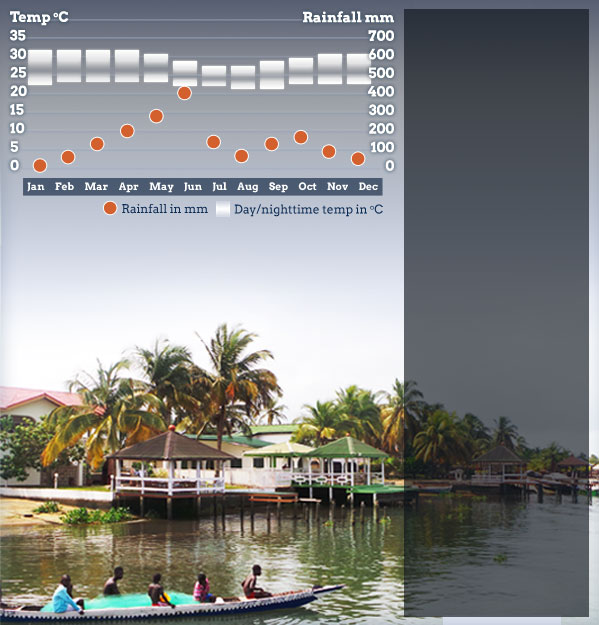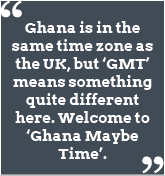Best time to visit Ghana
temperature & rainfall
When to visit Ghana & when not to
A MONTH BY MONTH GUIDE
Mid-November to April is the dry season, and the easiest to travel in. You won’t have issues with blocked roads from floods, and wildlife will be easier to spot as it will be clustered around the scarce waterholes – particularly in the driest months of January , February and March.
The harmattan wind blows down from the Sahara from November or early December through to March. It can cool temperatures a bit, but be prepared for extreme dryness – bring moisturiser and lip balm (or stock up on local shea butter!), and expect a tickly throat. Contact lens wearers may want to bring glasses or eye drops in case of discomfort, and photographers should prepare for hazy pics, and avoid changing lenses outdoors. On occasions, flights can be cancelled due to poor visibility, particularly in Tamale.
In the wetter center and south of Ghana, rains usually fall in April, May and June, with a brief respite from July to August. There is then a shorter rainy season in September, October and the first half of November. In the more desert-like north, the rains arrive from March to September. But thanks to the dry earth, when the rain does fall it can cause terrible flooding and blocked roads in the north.
There are a number of festivals and events throughout Ghana, some have fixed dates, such as the Dipo festival (see below). Others happen frequently, such as the Ashanti Akwasidae celebrations. These take place every six weeks, on Sundays. The Ashanti king is present, along with his chiefs, and before meeting with them he takes part in an impressive parade, with drumming, dancing, horns and singing. The king’s Golden Stool also plays a key role – as the festival commemorates the day it was brought down from heaven.
The harmattan wind blows down from the Sahara from November or early December through to March. It can cool temperatures a bit, but be prepared for extreme dryness – bring moisturiser and lip balm (or stock up on local shea butter!), and expect a tickly throat. Contact lens wearers may want to bring glasses or eye drops in case of discomfort, and photographers should prepare for hazy pics, and avoid changing lenses outdoors. On occasions, flights can be cancelled due to poor visibility, particularly in Tamale.
In the wetter center and south of Ghana, rains usually fall in April, May and June, with a brief respite from July to August. There is then a shorter rainy season in September, October and the first half of November. In the more desert-like north, the rains arrive from March to September. But thanks to the dry earth, when the rain does fall it can cause terrible flooding and blocked roads in the north.
There are a number of festivals and events throughout Ghana, some have fixed dates, such as the Dipo festival (see below). Others happen frequently, such as the Ashanti Akwasidae celebrations. These take place every six weeks, on Sundays. The Ashanti king is present, along with his chiefs, and before meeting with them he takes part in an impressive parade, with drumming, dancing, horns and singing. The king’s Golden Stool also plays a key role – as the festival commemorates the day it was brought down from heaven.
WHAT HAPPENS WHEN IN GHANA
RESPONSIBLE TRAVEL RECOMMENDS
Jim O’Brien, from our supplier Native Eye Travel, recommends his best time to go to Ghana:
“The best time to go is October to about March. Ghana’s roads are reasonably good unless you’re going off into the bush. The rainy season there is the same as it is next door in the Ivory Coast and Liberia and so on, but Ghana is one of the only places in West Africa where we do offer trips in the summer because the rainy season doesn’t disrupt the travel too much.”
FESTIVALS & EVENTS IN GHANA
OUR PICK FROM GHANA’S CULTURAL CALENDAR
Did you know about...?
The Dipo Festival
Dipo take place in April-May every year in the Eastern Region and is a coming of age ceremony for young Krobo women. Their heads are shaved and they spend a week taking lessons in how to “train” for womanhood – cooking, housekeeping, looking after children and seducing their husbands. The festival marks their release into the community, draped with beads, with much fanfare – and on the final day of the celebrations the women perform the Klama dance they have been learning.
Dipo take place in April-May every year in the Eastern Region and is a coming of age ceremony for young Krobo women. Their heads are shaved and they spend a week taking lessons in how to “train” for womanhood – cooking, housekeeping, looking after children and seducing their husbands. The festival marks their release into the community, draped with beads, with much fanfare – and on the final day of the celebrations the women perform the Klama dance they have been learning.
Photo credits:
[Temp chart - river: Nora Morgan]
[helpdesk: Stig Nygaard]
[What happens when in Ghana - Jim O'Brien: Stig Nygaard]
[Festival: David Stanley]
Ghana, Togo and Benin vacation, gold and magic
Traditional villages and voodoo in Ghana, Togo and Benin
From
£3199
14 Days
ex flights
Transatlantic slave trade tour, Ghana
Historical and cultural tour of Ghana
From
US $1880
8 Days
ex flights
A week in Ghana vacation
The perfect introduction to Ghana, run by locals
From
US $2995
6 Days
ex flights
Ghana highlights and festival vacation
Celebrate Ghanaian culture & music at Afrofuture Festival
From
US $4275
10 Days
ex flights
Ghana culture, nature and beach vacation
Explore Ghana’s stunning eco-beaches and unspoiled hotspots
From
US $3195
6 Days
ex flights
Ghana vacation, coastal tour
Explore the exciting beaches and nature along coastal Ghana.
From
US $1175.63
7 Days
ex flights
Cultural history vacation in Ghana
Authentic Ghana Eco, Culture, History and Wildlife Tours
From
US $750
14 Days
ex flights














